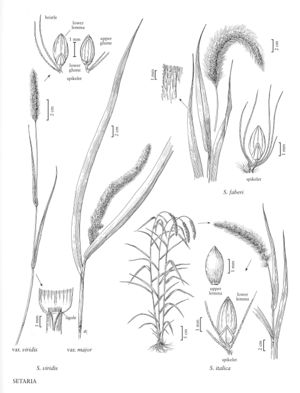Difference between revisions of "Setaria faberi"
imported>Volume Importer |
imported>Volume Importer |
||
| Line 43: | Line 43: | ||
|publication year= | |publication year= | ||
|special status=Introduced | |special status=Introduced | ||
| − | |source xml=https:// | + | |source xml=https://bitbucket.org/aafc-mbb/fna-data-curation/src/2e0870ddd59836b60bcf96646a41e87ea5a5943a/coarse_grained_fna_xml/V25/V25_1422.xml |
|subfamily=Poaceae subfam. Panicoideae | |subfamily=Poaceae subfam. Panicoideae | ||
|tribe=Poaceae tribe Paniceae | |tribe=Poaceae tribe Paniceae | ||
Revision as of 21:02, 5 November 2020
Plants annual. Culms 50-200 cm. Sheaths glabrous, fringed with white hairs; ligules about 2 mm; blades 15-30 cm long, 10-20 mm wide, usually with soft hairs on the adaxial surface. Panicles 6-20 cm, densely spicate, arching and drooping from near the base; rachises densely villous; bristles (1)3(6), about 10 mm. Spikelets 2.5-3 mm. Lower glumes about 1 mm, acute, 3-veined; upper glumes about 2.2 mm, obtuse, 5-veined; lower lemmas about 2.8 mm, obtuse; lower paleas about 2/3 as long as the lower lemmas; upper lemmas pale, finely and distinctly transversely rugose; upper paleas similar to the upper lemmas. 2n = 36.
Distribution
Conn., N.J., N.Y., W.Va., Del., D.C., Wis., Ont., Que., Fla., La., Tenn., N.C., S.C., Pa., N.H., R.I., Kans., Nebr., Okla., S.Dak., Va., Md., Mass., Vt., Calif., Ala., Ark., Ill., Ga., Ind., Iowa, Ariz., Maine, Ohio, Mo., Minn., Mich., Miss., Ky.
Discussion
Setaria faberi spread rapidly throughout the North American corn belt after being accidentally introduced from China in the 1920s. It has become a major nuisance in corn and bean fields of the midwestern United States.
Selected References
None.
